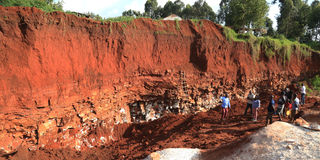Premium
Two Kisii soapstone miners die as locals decry slow disaster response

Soapstone mining site in Kisii. There have been increased cases of accidents in such sites as they walls cave in.
Loose soil forms the top layer of the soapstone mines in Kisii County.
The layers of soil hang precariously as the miners work below, oblivious of the danger lurking above them.
Death and injuries can occur when the soil tumbles into the deep end of the soapstone caves.
This is the grim situation in most soapstone mines in South Mugirango. Even though the caves are a mining hazard, residents still enter them to get the coveted rocks.
On Saturday, two people died after a soapstone quarry caved at Nyabigena in Tabaka sub-county.
One of the victims was crushed to death in the mines while their lucky colleague was receiving treatment at Tabaka Mission Hospital.
Two other rescued miners were recuperating at the same hospital.
Tabaka Sub-County Commissioner Samuel Towett said the government had banned mining of soapstones at the quarry.
"The quarry is a death trap and we are calling on the miners to keep off the area because it is dangerous. It has loose soils surrounding it," said Mr Towett.
Residents told Nation.Africa that this was the third time that this particular quarry had caved in.
But even with the danger in the caves, miners said they would return to them, because quarrying is their livelihood.
A few metres from the collapsed mine, a dozen other miners were busy working in different quarries, unbothered by the accident that had claimed the lives of two of their colleagues.
They described the accident as unfortunate but said life must go on.
For years, most soapstone carvers have lived in squalor, despite the abundance of a natural resource, considered a gem.
Exploited by middlemen and apparently hit hard by failing international markets for their products, the stone carvers of Kisii are a frustrated lot.
The carvers endure harrowing hardships to mine stones and carve their sculptures.
They then clean up the sculptures to refine them before taking them to the market to try and earn some money for their hard work.
They struggle in the quarries, mining the white stones before a tedious backbreaking process of preparing the carvings. The artworks fetch a pittance in the market but the miners are determined to carry on with their trade, hoping for better times in the future.
Mr John Orwenya says the county government had promised to help them get rid of the loose top layer with machines so that the miners could be left with only the rocks, but that has not happened.
“The cost of living has gone up. Since time immemorial, soapstone mining and carving have been the livelihood of many South Mugirango residents. You cannot tell them to wait in their houses idling as the government fixes the mining conditions. They will die of hunger,” said Mr Orwenya.
He said despite the dangers posed by the mines, circumstances had forced them to continue mining.
“We need food, money and other forms of survival. Here, we only know of mining soapstone, which is our main economic activity. No matter what, we must mine,” said Mr Orwenya.
Mrs Mary Kemunto, from Bogitenga sub-location, says even when disaster occurs, they use spades and hoes to scoop the soil and to reach their injured colleagues.
“Here, we do not have protective gear and we also lack machinery to help retrieve the bodies of colleagues trapped in the soils. The most we use is hoes and spades, and it takes time to scoop the huge mounds of soil, which collapses and traps our colleagues,” said Ms Kemunto.
The miners accused the county disaster team of late response to their distress calls when accidents occur.
“Two years ago, the county government promised us a soapstone factory here. But nothing tangible has happened so far,” said Ms Kemunto.
Mr Reuben Tung’ai said he had known soapstone all his life, but working conditions had not changed.
“We have decided not to pay taxes because our working environment has remained the same. The county and national governments need to use the taxes to improve our roads and social amenities here,” said Mr Tung’ai.
In 2019, former Mining Cabinet Secretary John Munyes and Kisii Governor James Ongwae promised to help soapstone carvers by installing a processing industry and helping them access the international market for the products, but that was just that – a promise.
During his visit, Mr Munyes said he was aware that small-scale miners had not been earning from this venture. He said he was aware of the dangers the miners were exposed to.
“The way they do their mining is also risky besides [not having] proper tools to do this. With the factory in place, there will be order,” said Mr Munyes at the Nyabigena site.
The CS said a factory would help locals organise themselves to sell value-added products locally and overseas.





